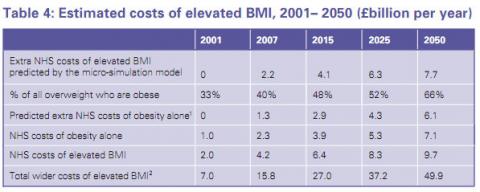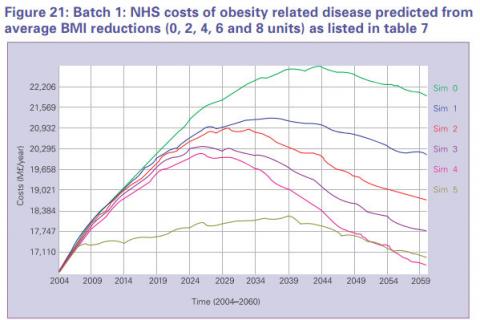How much does obesity cost the NHS?
"Take obesity: it already costs our NHS a staggering £4 billion a year. But within four years, that figure's expected to rise to £6.3 billion." David Cameron, 16 May 2011.
Last week David Cameron delivered a speech outlining the Government's continued commitment to the reform of the NHS, laying out some of the reasons he believed justified and necessitated the reforms
High and growing levels of obesity in the UK, and the associated health costs, was one such reason he highlighted. With the NHS facing growing costs from treating patients with obesity linked conditions, Mr Cameron said that the NHS had to focus on efficiency and reduce management costs.
Join 72,953 people who trust us to check the facts
Sign up to get weekly updates on politics, immigration, health and more.
Subscribe to weekly email newsletters from Full Fact for updates on politics, immigration, health and more. Our fact checks are free to read but not to produce, so you will also get occasional emails about fundraising and other ways you can help. You can unsubscribe at any time. For more information about how we use your data see our Privacy Policy.
Because the cost of obesity and the associated health conditions are regularly highlighted in politics and the media, Full Fact went in search of more details.
The figures cited by the Prime Minister are the same as those stated by the Department of Health, whose estimates come from a Foresights report: 'Foresight Tackling Obesities: Future Choices Project'.
The report was looking at current obesity and associated costs and sought to model future trends in obesity and its impact on health. Doing this, the study produced a series of cost estimates for obesity to the NHS, for elevated Body Mass Index (BMI) to the NHS, and the wider costs to the economy of elevated BMI. All of the projections are set at 2007 costs for easy comparison.

The £4.2 billion figure, rising to £6.4 billion by 2015, that David Cameron and the Department of Health are referring to corresponds with the 'NHS costs of elevated BMI' — those who are obese and also overweight patients. Strictly speaking, the costs of obesity alone were in 2007 estimated at £2.3 billion, with a projection to rise to £3.9 billion by 2015.
It is important to note that the figures are calculated to include health costs incurred from conditions for which obesity was likely a contributory factor, as well as the direct cost of treating obesity.
The Foresight report goes into some detail on the associated conditions. For example, the note that: "The risk of developing type 2 diabetes, for instance, is some 20—80 times more likely for people who are obese compared with lean people. Coronary heart disease (which itself is slightly more common among obese people) is 2—3 times more common among diabetic men and ?ve times more common among diabetic women." Other health risks are also mentioned, such as strokes, many cancers, and osteoarthritis.
They explain that the cost increases denoted as 'extra' costs are attributable solely to changing BMI levels from 2001, and the complex effects this will have on, for example, longevity and therefore numbers of people at risk.
Older estimates of the cost of obesity, still often referred to, were done by the House of Commons Health Committee in 2003/4. They concluded: "We estimate the economic costs of obesity conservatively at £3.3—3.7 billion per year and of obesity plus overweight at £6.6—7.4 billion." Of this, they attributed £991-1124 million to direct healthcare costs of treating obesity and its consequences.
Since 2007 there has not been any significant research looking directly at the economic costs of obesity, according to the National Obesity Observatory.
While the Foresight forecast from 2007 is the best estimate that is currently available, it is worth keeping in mind that it is now several years out of date, and that the future projections of the study are based upon obesity levels where no action is taken to address the problem. Their study also looked at different cost scenarios based upon reduced levels of obesity into the future.

The NHS Information Centre also compile data on the estimated costs of directly treating obese patients. For example, the state that: "The total NIC for drugs for the treatment of obesity increased from £6.6 million in 2000 to £46.8 million in 2009, reaching its peak in 2007 at £51.6 million."
Conclusion
The economic cost of obesity to the NHS that David Cameron is referring to does correspond with the best data currently available on the issue. These figures are based upon looking not only at the direct cost of treating obesity in the NHS, but also include the costs of health conditions which patients have that are likely attributed to obesity.
However, while these are the best estimates available, they are still projections of costs based on a future scenario where growing obesity is not tackled.